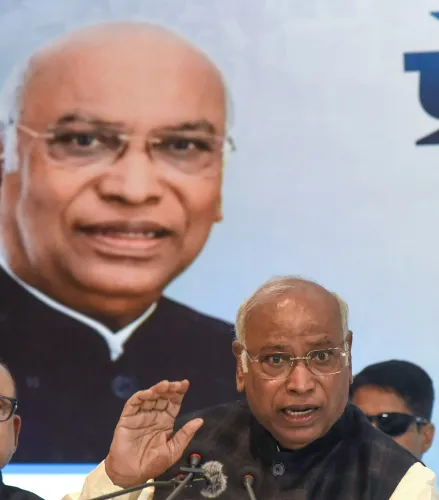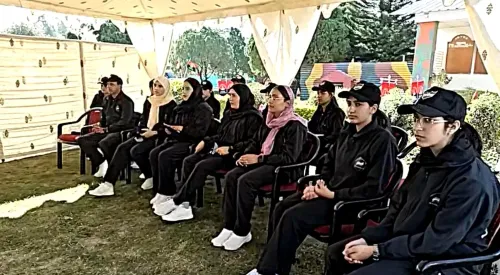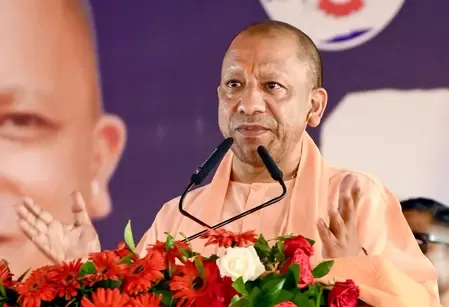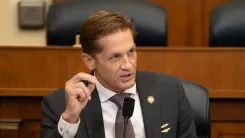How is Rajasthan Police Addressing Human Trafficking?
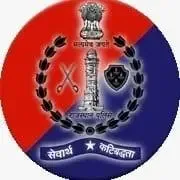
Synopsis
Key Takeaways
- Collaboration among departments is vital in combating human trafficking.
- Victim identification and rehabilitation strategies need enhancement.
- Modern technology must be utilized in enforcement efforts.
- Public awareness is crucial for preventing trafficking.
- Comprehensive legal frameworks are necessary to prosecute traffickers effectively.
Jaipur, July 18 (NationPress) The Anti-Human Trafficking Unit (AHTU) of the Rajasthan Police commenced a two-day state-level conference on Friday at the Rajasthan Police Academy, Jaipur.
This event, which addresses pressing matters like bonded labour, sex trafficking, and cross-border trafficking, is being organized by the Civil Rights and Anti-Human Trafficking (AHT) Branch of the Rajasthan Police Headquarters, following directives from the Ministry of Home Affairs, Government of India.
Officials indicated that the main goal of this conference is to foster thorough discussions on the ever-changing aspects of human trafficking. It aims to enhance systems for victim identification and rescue, ensure effective rehabilitation and reintegration, and enforce strict legal measures against traffickers.
"The conference also encourages collaboration among various departments and states to create a strong coalition against trafficking. By gathering frontline enforcement officers and specialists, the Rajasthan Police seeks to improve coordination, build capacity, and facilitate knowledge sharing among agencies involved in anti-human trafficking initiatives," an official stated.
Malini Agarwal, an IPS officer, emphasized: “Human trafficking is a serious, organized crime that robs individuals of their basic rights. Victims are frequently ensnared due to poverty—the primary cause. The ILO's 2024 report indicated that yearly profits from human trafficking soared to $236 billion, marking a 37 percent increase since 2014. This conference is a vital step in fortifying Rajasthan’s response and reaffirming our commitment to safeguarding vulnerable communities.”
Sanjay Agarwal, IPS, mentioned, “Trafficking often starts in rural areas, not merely urban ones. When we observe children begging or laboring on the streets, we should inquire about their backgrounds. Today’s traffickers leverage technology to exploit victims—our enforcement must evolve and use digital tools to confront this shifting challenge.”
Dr. P.M. Nair, IPS (Retd.), stated: “We must not turn a blind eye to trafficking. Collective action is essential across source, transit, and destination areas. Trafficking is an organized crime comprising various offenses. Like an amoeba, it regenerates unless the entire network is dismantled.”
According to the National Crime Records Bureau (NCRB), in 2022, there were 2,250 reported cases nationally, involving 2,878 children and 3,158 adults.
A total of 6,693 victims were rescued and 5,864 individuals were arrested. In Rajasthan, 117 cases were filed, and 461 victims were saved—432 of whom were victims of forced labour. Rajasthan’s geographical closeness to economically prosperous states like Gujarat, Maharashtra, and Uttar Pradesh makes it a significant source and transit area for traffickers. Vulnerable communities, particularly from SC/ST and tribal backgrounds, are enticed with false job promises and forced into exploitative work. In numerous instances, entire families are trafficked into bonded labour.
Since the 1980s, Rajasthan has witnessed a surge in industries such as brick kilns, particularly after environmental regulations necessitated their relocation from cities like Agra. These unregulated sectors remain prime environments for bonded labour.
According to the Planning Commission, 83 percent of rehabilitated bonded labourers belong to SC/ST communities. On Friday, a public-awareness poster about human trafficking, intended for display in police stations and government offices, was launched.
The inaugural session featured notable attendees including Malini Agarwal, IPS, Director General of Police, Civil Rights & AHT Branch, Deepak Bhargav, IPS, Deputy Inspector General, Intelligence Training Academy, Sanjay Agarwal, IPS, Director General, Intelligence, Dr. P.M. Nair, IPS (Retd.), Former Director, National Disaster Response Force (NDRF), MHA, Manju Vijay, Joint Secretary, Home Department, and Ajoy Varghese, Senior Vice President, International Justice Mission (IJM), the technical partner for the conference.
On Saturday, Vimukt, a handbook detailing best practices to combat human trafficking, will be launched. It will serve as a practical resource for enforcement and allied agencies.
The conference is anticipated to yield actionable results, including improved strategies, policy recommendations, and inter-agency collaboration frameworks, aimed at preventing trafficking and ensuring justice for survivors, officials added.


